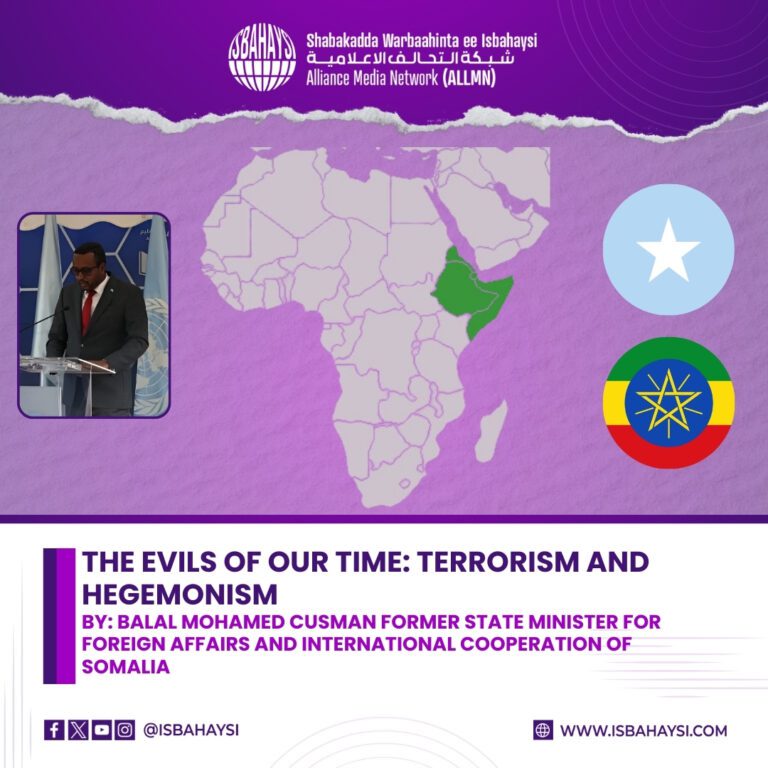
In the contemporary history of the Horn of Africa Region, hegemonism and terrorism stand out as two of the most destructive evils. These phenomena not only disrupt peace and security but also undermines the principles of justice and equality. Understanding their origins, manifestations, and impacts is therefore crucial to addressing these challenges and fostering a more stable and just regional order.
Terrorism, by its very nature, is designed to instil fear and chaos in the hearts and minds of the people. It involves the use of violence or the threat of violence to achieve political or ideological objectives. In the modern era, the world has witnessed a surge in terrorist activities, generally driven by various factors including political instability, socio-economic disparities, religious extremism, and geopolitical rivalries. However, the root causes of terrorism in the Horn of Africa are multifaceted as, on top of the general factors, foreign occupation, or perceived injustice, often provide fertile ground for terrorist ideologies to take root. Socio- economic factors, including chronic poverty, lack of education, and unemployment, can also drive youngsters toward extremist groups that promise a sense of purpose and belonging. Horn of Africa Region has experienced religious extremism turning faith into a weapon of mass destruction killing innocent people in their thousands, particularly when manipulated by charismatic leaders. However, we must all understand that terrorism is not confined to any single region or ideology. Equally though, hegemonic ambitions in the Horn of Africa poses significant threats to peace and stability of the region and beyond.
Hegemonism is characterized by the exercise of power and influence to control or annex of other sovereign nation’s assets, often disregarding their sovereignty and territorial integrity as well as the international laws and norms. Historically, hegemonism has been a feature of international relations, with empires and powerful states seeking to expand their influence. The colonial era, the Cold War, and contemporary geopolitical strategies reflect the enduring nature of hegemonic ambitions. Major world powers, due to their military and economic might may leverage their economic dominance and sometimes military power to control resources elsewhere, however, the endeavour of a fragile country – such as Ethiopia – in copying big powers is dangerous and detrimental to regional stability in the 21st century. Such action can only foster resentment and resistance in the region, once again leading to conflicts and bloody wars that could be avoided. Hence, the hegemonic aspiration of the current Ethiopian government to willy-nilly get access to Somali’s sea waters will have severe consequences both for the Horn of Africa Region and global peace and stability. Such ambitions exacerbate the already fragile political and social instability, igniting more conflicts, further fuelling the humanitarian crises, undermining the already fragile governance structure in both Ethiopia and
the rest of the regional countries. The resulting instability not only will it destabilize the Horn of Africa, but it will also have ripple effects on the Gulf of Aden strait – one of the most important waterways in the world, as much as it exponentially increases refugee flows.
In today’s interconnected world, it is crucial to recognize that the era of confrontation and expansionism in the Horn of Africa has passed. Unlike anytime in the past, the region has the potential to enter a new era where cooperation and collaboration can be nurtured. However, hiding behind good words while steadfastly adhering to your original plan can complicate diplomatic efforts, as it undermines trust and transparency. Such an approach may be perceived as insincere, further causing misunderstanding and potentially escalating tensions as it masks true intentions and hinders genuine negotiation and compromises. Effective diplomacy requires rationality and flexibility to foster mutual understanding and resolve conflicts!. instead, by working together and genuinely fostering mutual understanding, regional leaders can collectively address the common challenges and build a more peaceful, prosperous future for all. Collectively confronting the evils of terrorism and expansionism in the Horn of Africa Region requires a multifaceted approach. For terrorism, addressing root causes such as chronic poverty, rebuilding purposeful and organic governance structures and ideological indoctrination is crucial, whereas, combating expansionism involves promoting and safeguarding the rules-based international order where all states, regardless of size or political/economic/military power, are treated with respect and equality. Strengthening international institutions, fostering dialogue, and supporting multilateralism are also essential steps towards confronting expansionism.
Terrorism and hegemonic ambition are indeed among the most pressing evils of our time in the Horn of Africa Region as they threaten regional peace, security, and justice, perpetuating cycles of violence and instability. Addressing these challenges therefore requires a collective commitment to the values of justice, equality, and mutual respect. Only through concerted efforts can we hope to build a region where fear and domination give way to peace and cooperation.
Profile of the Author:
Author: Balal Mohamed Cusman, the former state minister for Foreign Affairs and International Cooperation of the Federal Republic of Somalia. Email: [email protected]